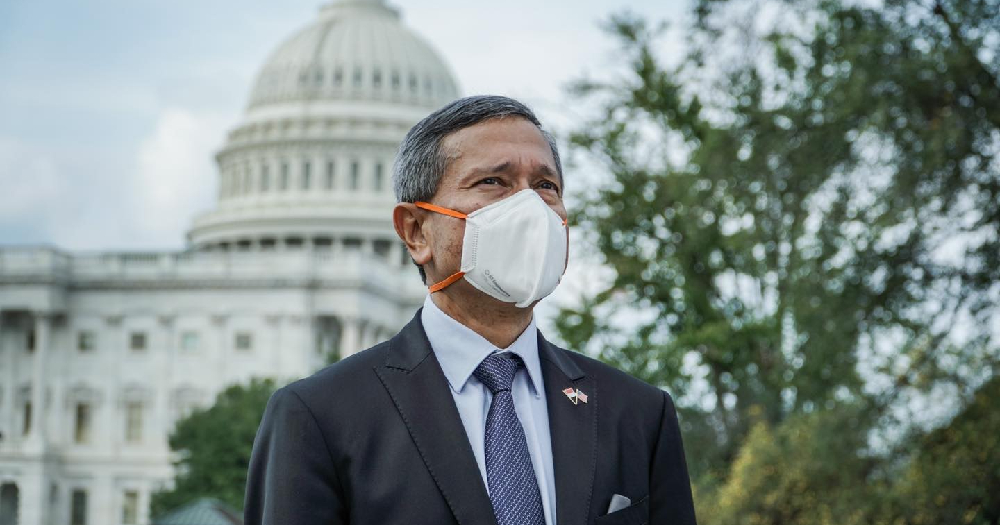Follow us on Telegram for the latest updates: https://t.me/mothershipsg
Singaporeans "cannot afford to believe" that in erecting walls and tariff barriers to keep foreigners out, they would be shielded from competition, Foreign Affairs Minister Vivian Balakrishnan said on Sep. 29.
Singaporeans can rise to the challenge
Speaking at a media doorstop after his working visit in Washington D.C., where he met with U.S. Secretary of State Antony Blinken, veteran diplomat Kurt Campbell, as well as some members of Congress, Vivian said Singapore needs to "double down to prepare for the jobs of the future" at a time of uncertainty during the digital revolution, adding that the government has to "remake, reskill and re-uplift" the people to go after such jobs of the future as well.
The digital revolution that's in play currently is disrupting jobs, wages and causing anxiety throughout society, particularly the middle classes, he further explained, adding that anxiety over possibly getting replaced by either competition or technology is contributing to a "pushback" against globalisation and the ongoing digital revolution.The foreign minister was responding to a question from CNA on "whether Singaporeans can understand the geostrategic forces that are playing out" and "rise up to the challenges and grab opportunities", to which he answered in the affirmative.
"I think Singaporeans do appreciate the delicacy of the moment and the enormity of the stakes," he said.
He added:
"If you just take a step back -- we have only been independent for 56 years.
If you look at the way we transformed ourselves from an entrepot into an advanced manufacturing site, into a key node in a global economy, with multinationals, with access to technology, access to new markets, and the confidence of a Singaporean citizenry who will prepare to compete, compete head on, on the basis of education, organisation, or what Mr Lee Kuan Yew described as a hard-working and disciplined people."
World needs to work together on common challenges
Vivian further added that the digital divide is not the only common challenge that the world is facing.
Both "the looming threat of climate change", as well as the Covid-19 pandemic, are areas that countries need to work collectively on, failing which, would result in "a dangerous, difficult world for all of us", he said.
In response to questions on U.S.-China relations, Vivian also emphasised that from his interactions with leaders on both sides, he has gotten "a clear signal that both countries "want to avoid collision".
"I think everyone is painfully aware of the enormous consequences if a collision, either by design or unwittingly by accident, occurs," he said.
This was a point he made in a previous media doorstop he had in New York, after giving Singapore's national statement at the United Nations General Assembly.
Southeast Asia wants to be seen on their own merits
In addition, Vivian stressed that the goal of his trip to the U.S. was to give them "a view from Southeast Asia", which recognises that the dynamics of the U.S.-China relationship have "enormous consequences" on the region.
"Southeast Asia does not want to become a token, or a lever, or an arena for proxy contests between the two superpowers," he said, adding that both the region and Singapore want to be "taken on [their] own right".
Vivian emphasised the economic potential of the region as well, saying that the combined GDP of US$2.8 trillion (S$3.8 trillion) of all Southeast Asian countries will "double and then subsequently quadruple in the next two decades".
He added that as the U.S. is the largest investor in Southeast Asia, and has invested in the region more than it has in India, China, Japan and South Korea combined, the major power, therefore, has "skin in the game".
On the other hand, Vivian highlighted that China is the largest trading partner for almost all countries in Southeast Asia, and made the point that the region is bustling and full of "great opportunities" that are emerging in the next two decades.
"Take Southeast Asia seriously on our own merits, and not just look at us in terms of the great big power competition," he said.
Saying that this is a point that he will keep driving home, he further elaborated, "Southeast Asia is not just an item on the menu. We want to be at the table, we want to discuss, and we want to help shape the agenda."
Vivian stressed that the world is transitioning to a multipolar system as well -- not just one that's dominated by the two major powers, China and the U.S.
China moves to deepen economic ties in Asia-Pacific with CPTPP
Continuing on the topic of free trade, Vivian touched on the CPTPP (Comprehensive and Progressive Agreement for Trans-Pacific Partnership), a major trade deal that China has recently formally applied for, revealing that the U.S. "would not proceed" with it, following the lack of "appetite" domestically to proceed with its earlier iteration, the TPP (Trans-Pacific Partnership).
The UK had applied to join the trade deal earlier in February, while Taiwan had done so after China made its bid.
Vivian further elaborated on how the U.S. has to "decide its role" in the larger economic integration, trade and investment across the Pacific, saying, "It is ironic – having been there at the creation and having substantially negotiated a very ambitious free trade agreement – for the United States to subsequently not have any role at all in the emerging economic architecture in Southeast Asia."
China's move to join the CPTPP -- despite the odds against it due to the trade pact's strict rules on intellectual property, data flows and labour -- has been touted by analysts as a smart move against the U.S., especially with the latter's absence in the agreement.
Top image via Vivian Balakrishnan's Facebook page
Follow and listen to our podcast here
If you like what you read, follow us on Facebook, Instagram, Twitter and Telegram to get the latest updates.
